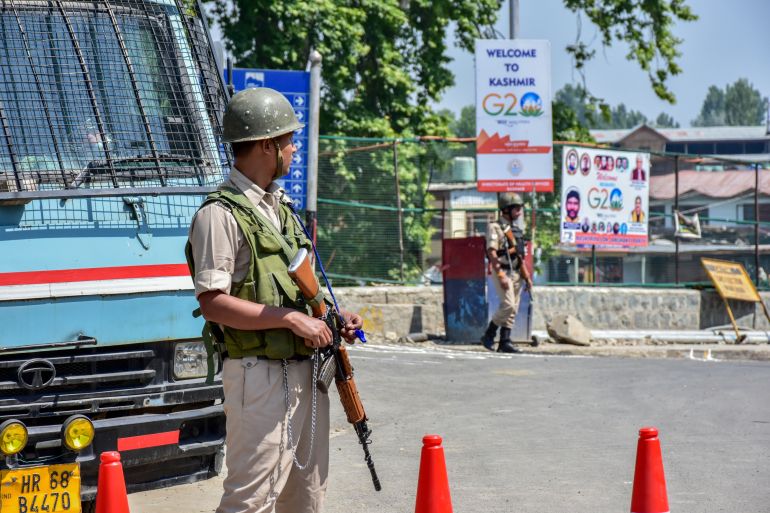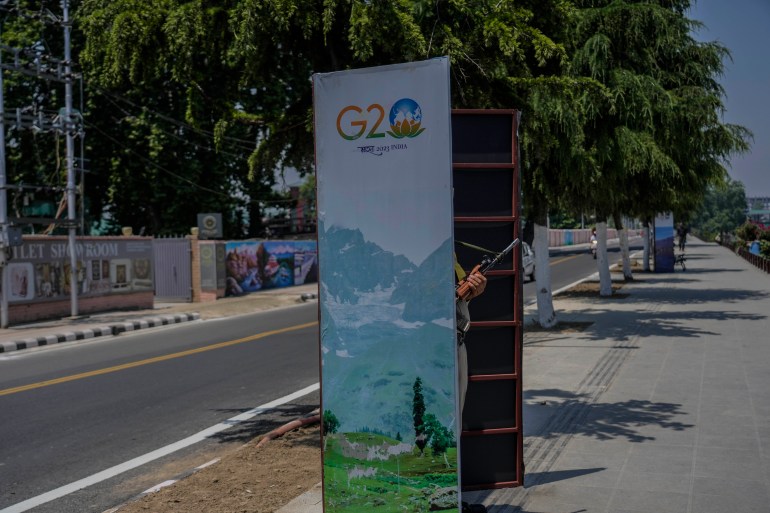As India holds G20 meet, ‘brutal’ Kashmir media crackdown slammed
The Committee to Protect Journalists demands ‘immediate release of four arbitrarily detained Kashmiri journalists’.

As New Delhi holds a Group of 20 (G20) tourism meeting in Indian-administered Kashmir, a leading watchdog has condemned the crackdown on media and arrests of journalists in the region.
The New York-based Committee to Protect Journalists (CPJ) said press freedom remains under attack even as India tries to project normalcy in the disputed region.
Keep reading
list of 4 itemsChina to boycott G20 meeting hosted by India in Kashmir
Is India projecting ‘normalcy’ in Kashmir by holding G20 meeting?
India arrests Kashmiri journalist amid ongoing media crackdown
“CPJ calls on the Indian government to end its brutal crackdown on the media and immediately release the four arbitrarily detained Kashmiri journalists,” the group said in a statement shared on Twitter on Monday. The journalists it wants freed are Asif Sultan, Fahad Shah, Sajad Gul and Irfan Mehraj.
As #India holds a #G20 meeting on tourism in Kashmir, #pressfreedom remains under attack in the region.
CPJ calls on the Indian government to end its brutal crackdown on the media and immediately release the four arbitrarily detained Kashmiri journalists.#FreeThePress pic.twitter.com/zKo4rwz6iK
— CPJ Asia (@CPJAsia) May 22, 2023
Sultan, who was a reporter with the Kashmir Narrator magazine, was arrested in 2018 under the stringent Unlawful Activities Prevention Act (UAPA), an “anti-terror” law. He was charged with murder, attempted murder and harbouring rebels, but his family says he was targeted for the stories he wrote.
Shah was the editor of the Kashmir Walla website. He was arrested in February last year under the same UAPA law for “glorifying terrorism” in his writings.
Gul worked with Shah’s magazine and was arrested in January last year for spreading “false narratives” about India’s rule in its only Muslim-majority region.
Gul was booked under the Public Safety Act, a preventive detention law under which a person may be jailed for a year and sometimes more without bail.
Mehraj was jailed two months ago under “terrorism” charges for his association with a local human rights group, the Jammu and Kashmir Coalition of Civil Society, where he formerly worked as a researcher.
All four journalists have been sent to prisons outside Indian-administered Kashmir, making it difficult for their families to visit them.
Press freedom worsened in the region after August 5, 2019, when Prime Minister Narendra Modi’s Hindu nationalist government unilaterally stripped Kashmir of its limited autonomy and brought it under New Delhi’s direct control.
Thousands of people – including top politicians, activists, journalists and lawyers – were arrested as New Delhi tightened its control over the region, which is also claimed by neighbouring Pakistan.
Since then, Modi’s government has introduced a series of laws and policies that residents say are aimed at undermining their rights and denying them their livelihoods.
Kashmiri journalists say they are operating in a climate of fear since 2019 as homes of several journalists have been raided and they have been summoned by the police for questioning. Many journalists say they have been forced into self-censorship.
Observers described the measures as India’s attempts to silence the press from reporting about the realities in the region.
‘Real picture’
This year, Reporters Without Borders, a Paris-based media watchdog, ranked India 161 among 180 countries in its annual World Press Freedom Index, the lowest rank ever for the world’s largest democracy.
The CPJ released its statement as around 60 foreign delegates along with top Indian officials gathered in the region’s main city, Srinagar, starting on Monday for a three-day meeting to promote global tourism.
The meeting – the region’s first international event since 2019 – is being held under heightened security arrangements although visible signs of security deployments in one of the world’s most militarised regions have been removed.

Police officers and paramilitary forces are standing behind signs and cubicles erected across Srinagar as the delegates meet at a resort on the banks of the city’s famous Dal Lake. Military bunkers dotting the scenic city have been painted in blue while roads have been given a fresh coat of tar.
Locals have been barred from areas near the main venue while schools in some parts of the city have been closed until Wednesday.
Mehbooba Mufti, the region’s last elected chief minister, said on Sunday that Kashmir has been turned into “Guantanamo Bay”, the United States military prison in Cuba, for the G20 meeting.
India, which holds the G20 presidency this year, is hosting a series of meetings across the country leading to a summit to be held in New Delhi in September.
China, which has an ongoing border dispute with India, has boycotted the Kashmir meeting while Pakistan, which is not a G20 member, has criticised it being held in the disputed territory.
Indian media reports on Tuesday said there were indications that Saudi Arabia, Turkey and Egypt have also remained away from the event.
Siddiq Wahid, a Kashmiri political analyst, told Al Jazeera the Indian government is clearly trying to project normalcy by hosting the G20 meeting in the region.
“Unfortunately for New Delhi, the absence of China has dealt a blow to give that [normalcy] impression,” he said.
Geeta Sesu, co-founder of the Free Speech Collective, an advocacy group for freedom of speech in India, told Al Jazeera, “The barricading of security bunkers behind cheerful and scenic pictures of Kashmir for the G-20 meet is a good illustration of the condition of press freedom in the valley.”
“Journalists are jailed and the mobility and access of others are severely restricted,” Sesu said. “Will [G20] delegates be allowed to engage with the real picture? Or be satisfied with what they are allowed to see?”